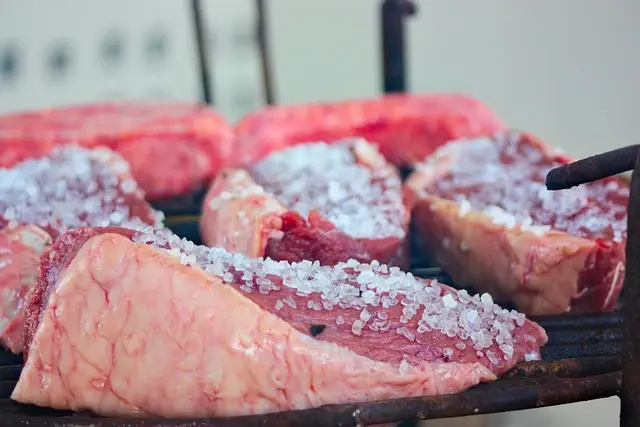Kratom, derived from the Mitragyna speciosa tree's leaves, has gained recognition for its potential to alleviate muscle soreness. Its key alkaloids, mitragynine and 7-hydroxymitragynine, may offer pain relief by interacting with opioid receptors. It is advisable for those interested in using kratom as a dietary supplement to approach it cautiously, ensuring the procurement of high-quality products from reputable sources and consulting healthcare providers due to potential interactions with other medications or existing health conditions.
For individuals aspiring to become kratom vendors, it is crucial to understand and adhere to the complex regulatory framework governing kratom sales, which includes complying with federal and state regulations such as those enforced by the FDA. Vendors must also commit to sourcing ethically and sustainably from verified farms, implementing stringent quality control measures, and ensuring product safety through rigorous testing for potency and purity. Aspiring vendors should be aware of the Agricultural Improvement Act of 2018's classification of kratom as a Schedule I substance under DEA terms, with varying enforcement across states. This requires staying informed on local regulations, securing necessary business licenses, understanding age restrictions, and ensuring full compliance to protect consumer health and promote responsible use. Becoming a successful kratom vendor necessitates a comprehensive approach that prioritizes safety, quality control, and regulatory compliance.
Exploring the potential of kratom as a natural remedy for muscle soreness, this article delves into the science behind its effects and guides aspiring vendors through the steps to become a reputable supplier. We’ll examine the most effective strains for alleviating post-exercise discomfort and discuss critical safety considerations and regulatory compliance issues essential for kratom vendors. Join us as we navigate the world of muscle relief and kratom vendor best practices, ensuring an informed approach to this intriguing supplement.
- Understanding Kratom's Role in Muscle Soreness Relief
- The Vendor's Journey: Steps to Become a Kratom Supplier
- Effective Kratom Strains for Muscle Soreness Management
- Safety Considerations and Regulatory Compliance for Kratom Vendors
Understanding Kratom's Role in Muscle Soreness Relief

Kratom, derived from the leaves of Mitragyna speciosa, has garnered attention for its potential role in muscle soreness relief. The alkaloids present in kratom, particularly mitragynine and 7-hydroxymitragynine, are thought to interact with the body’s opioid receptors, which may help in managing pain. This interaction could be beneficial for individuals experiencing muscle soreness from exercise, injury, or daily activities. Understanding kratom’s effects on pain relief is crucial for those considering it as an alternative remedy. Users report that kratom not only alleviates discomfort but also promotes a sense of well-being and energy, which can be particularly advantageous during recovery periods.
For those interested in exploring kratom as a supplement for muscle soreness, it’s important to approach its use with caution. Prospective users should seek high-quality kratom products from reputable vendors who adhere to strict quality control measures. Those considering how to become a kratom vendor should be aware of the regulatory environment surrounding kratom, as well as the importance of sourcing pure and potent kratom leaves. Vendors play a vital role in ensuring consumer safety and educating customers on proper usage and dosage to avoid adverse effects. As with any supplement, it’s essential to consult with a healthcare provider before integrating kratom into one’s wellness regimen, especially when dealing with pre-existing conditions or alongside other medications.
The Vendor's Journey: Steps to Become a Kratom Supplier

Embarking on the journey to become a kratom vendor involves a series of meticulous steps that ensure compliance with regulations and the provision of high-quality products. Prospective vendors must first familiarize themselves with the legal landscape governing kratom in their intended market. This includes understanding the legal status of kratom at both the state and federal levels, as well as adhering to the guidelines set forth by agencies such as the FDA. A thorough study of these regulations is crucial to navigate the industry responsibly and legally.
Once the legal framework is clear, potential vendors should source their kratom from reputable farms that practice sustainable harvesting methods to ensure the long-term viability of the kratom supply chain. Establishing relationships with such suppliers not only promotes ethical sourcing but also guarantees the purity and potency of the kratom offered. After securing a reliable source, vendors must focus on product quality control, ensuring that each batch meets stringent standards for alkaloid content and safety. This commitment to quality is paramount in building customer trust and maintaining a competitive edge in the marketplace. Additionally, vendors should invest in proper storage and packaging to preserve the integrity of the kratom until it reaches the consumer. By adhering to these steps and prioritizing compliance, transparency, and quality, aspiring kratom vendors can successfully enter this burgeoning industry.
Effective Kratom Strains for Muscle Soreness Management

When exploring the realm of kratom strains for managing muscle soreness, it’s crucial to understand the nuances of each strain’s effects and potential benefits. Maeng Da Kratom is often revered for its balanced alkaloid profile, which may offer potent pain-relieving properties. This strain is a favorite among those seeking relief from muscle aches due to its stimulating and analgesic effects, which can be particularly effective when engaging in physical activities that lead to soreness. Another strain worth considering for muscle soreness management is Bali Kratom, known for its sedating qualities, which can help alleviate discomfort and promote relaxation.
For those interested in how to become a kratom vendor, it’s essential to source high-quality kratom products and maintain compliance with local regulations. Vendors must provide accurate product information and ensure that their offerings are safely consumed. Two popular strains for muscle relief that vendors often stock are Indo Kratom and Thai Kratom. Indo Kratom, with its finely balanced alkaloid content, is known to produce effects that range from uplifting to relaxing, making it versatile for various consumer needs. Thai Kratom, on the other hand, is renowned for its stimulating properties and is often used to help manage physical exertion-related discomfort.
When considering kratom strains for muscle soreness, it’s important to start with a lower dose to gauge individual sensitivity and effects. It’s also advisable to consult with a healthcare professional before incorporating kratom into any wellness routine, especially if you have underlying health conditions or are taking other medications. As a kratom vendor, providing clear dosing guidelines and educating customers on the proper use of these supplements can contribute to their satisfaction and overall well-being.
Safety Considerations and Regulatory Compliance for Kratom Vendors

Prior to venturing into the realm of selling kratom products, aspiring vendors must be well-versed in the safety considerations and regulatory compliance that govern this industry. Safety is paramount when handling kratom; it’s essential to source high-quality, pure products from reputable suppliers to ensure consumer safety. Vendors should adhere to Good Manufacturing Practices (GMP) to maintain product integrity and prevent contamination, which is critical for long-term business sustainability. Regular testing of the kratom batch for both potency and purity is a non-negotiable step in the process, ensuring that the products sold are safe for consumer use.
Moreover, regulatory compliance is a complex but necessary aspect for anyone considering how to become a kratom vendor. The U.S. Food and Drug Administration (FDA) has issued warnings about the potential health risks associated with kratom, including its psychoactive properties and interactions with other substances. Vendors must stay informed about the evolving legal status of kratom at both federal and state levels. They should be aware of the Agricultural Improvement Act of 2018 (also known as the Farm Bill), which legally classifies kratom as a Schedule I substance in DEA terms but does not enforce this classification, leaving the matter open to interpretation and varying enforcement by different states. Compliance with local laws, obtaining necessary business licenses, and understanding the age restrictions for purchasing kratom are all critical steps for responsible vendors. Ensuring full compliance with these regulations is not only a legal requirement but also a moral responsibility to protect the well-being of customers.
Muscle soreness can be a significant impediment to one’s active lifestyle, but understanding how kratom supplements may alleviate this discomfort offers a promising alternative for relief. This article has navigated the multifaceted aspects of incorporating kratom into muscle soreness management, from elucidating its role in pain relief to outlining the journey to becoming a responsible kratom vendor. Aspiring vendors should heed the safety and regulatory compliance steps essential for providing quality products. By integrating effective strains like Maeng Da or Bali into their offerings, these vendors can contribute to the well-being of individuals seeking natural remedies for muscle soreness. Remember, while kratom may serve as a beneficial tool, it’s crucial to approach its use with informed guidance and adherence to legal frameworks.






